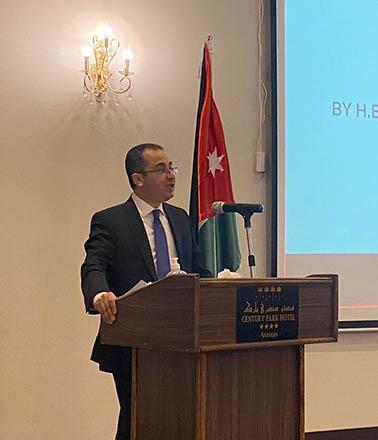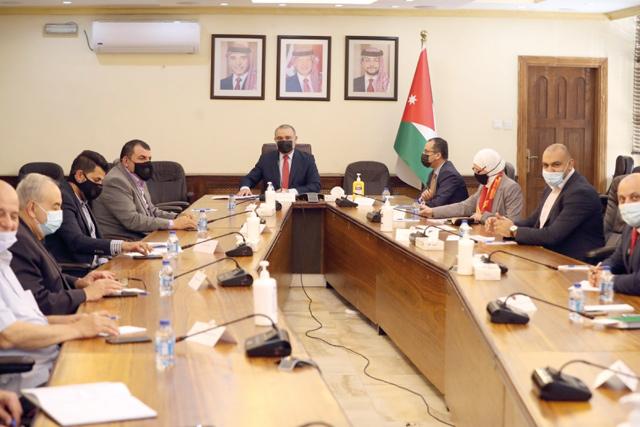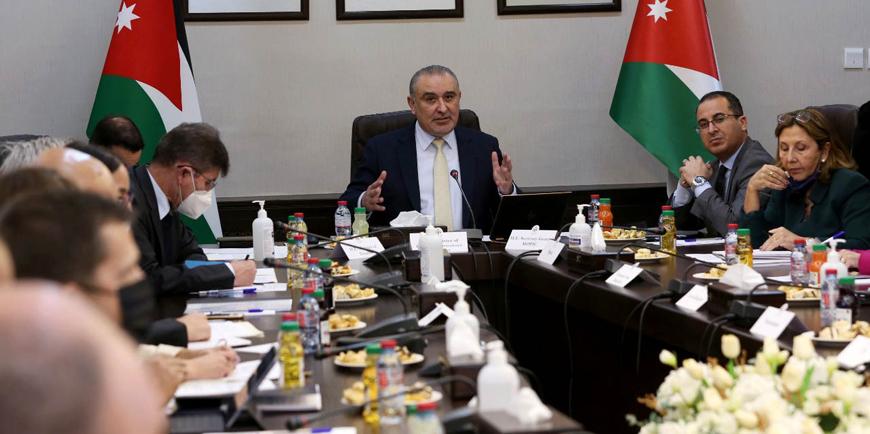You are here
Reforms to accelerate economic recovery ‘more important than ever before’ — Planning Ministry
By JT - Nov 17,2021 - Last updated at Nov 17,2021

Secretary General of the Ministry of Planning and International Cooperation Marwan Al Rifai speaks at the Technical Donors Meeting on Wednesday (Petra photo)
AMMAN — Secretary General of the Ministry of Planning and International Cooperation Marwan Al Rifai met with representatives of the international community on Wednesday during the Technical Donors Meeting on the updated Reform Matrix.
Representatives included donors and officials from embassies and international financing institutions, such as the World Bank and the European Bank for Construction and Development, according to a ministry statement.
The main objective of the meeting was to present the updated Reform Matrix. The main features of the mid-term review were led by the Reform Secretariat at the Planning Ministry, which included climate change and environmental mainstreaming across the Reform Matrix, and linkages to the Government Priorities Programme.
Rifai commended the donors’ support in implementing many of the reforms within the Reform Matrix that have been achieved through the Reform Support Fund.
He stressed that the Reform Matrix, launched at the Jordan Growth and Opportunity – The London Initiative, which took place in London in February 2019, is more important and relevant than ever. This is largely due to the impacts of the pandemic, which fuelled the need to expedite the reform process.
The Reform Matrix is the leading source for many international and bilateral arrangements, including those with the IMF, the World Bank and many partner countries, according to the statement.
The Reform Secretariat team at the ministry presented the updated Reform Matrix and the results of the mid-term review process and consultations with the government and the private sector.
The results included highlighting and ensuring the efficiency of the tourism sector, as well as other important sectors, such as the agriculture, water and public sectors.
Furthermore, the team briefly presented a set of the most important reforms achieved since 2018: A law on regulating the general budget and the budget of government unites, public-private partnership laws and bylaws, the adoption and implementation of the ISIC4 classification framework, the issuance of the nursery licensing bylaw in 2019 followed by the home-based childcare licensing instruction in 2021, the launch if the National Social Protection Strategy (2019-2025), the establishment of the Tourism Resilience Fund, the approval of an integrated National Intelligent Transport System, the launch of energy storage and e-mobility assessments, the continued implementation of energy efficiency and renewable energy water optimisation projects, and the launch of Food Security Strategy.
In addition, during the meeting, the Reform Secretariat team discussed how they have integrated environmental aspects across the Reform Matrix to enhance Jordan's transition to a green economy responsive to climate change and to support the government in attracting climate finance.
The meeting included interventions from representatives of the international community on the updated Reform Matrix.
At the end of the meeting, the attendees agreed on the importance of the continued partnership between the international community and the government, as well as the need to form technical working groups to better structure the partnership.
The Reform Matrix includes a set of priority and structural reforms over five years, aimed at macroeconomic stability, public sector efficiency and governance, improving the business environment and competitiveness of the private sector, increasing exports and the flow of foreign direct investment, facilitating access to finance, raising the efficiency of the labour market and increasing its flexibility, and improving and expanding the social safety net.
The Reform Matrix also focuses on policy reforms in the transport, energy, water, agricultural and tourism sectors.
To follow up on the progress and implementation of the Reform Matrix, the Reform Secretariat was established at the Planning Ministry in late 2019.
The Reform Secretariat consults with the relevant stakeholders on a regular basis to prioritise economic reforms and prepare periodic reports on the progress of their implementation.
Related Articles
AMMAN — Within the framework of coordination and consultation with non-governmental sectors, Minister of Planning and International Cooperat
AMMAN — The government has implemented 31 additional reform measures over the past six months as part of the "Strengthening Reform Managemen
AMMAN — Minister of Planning and International Cooperation Nasser Shraideh and UK Minister for the Middle East and Asia Amanda Milling on Th


















